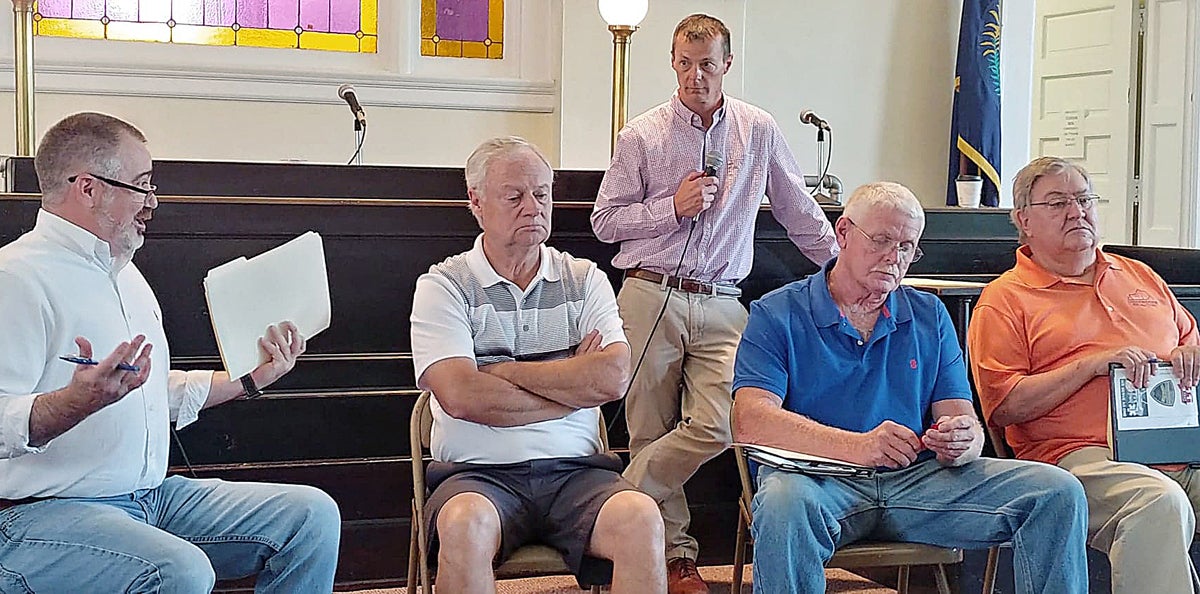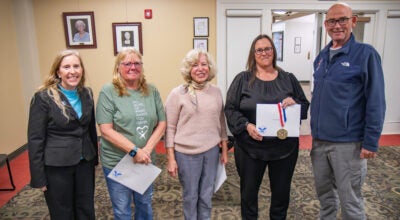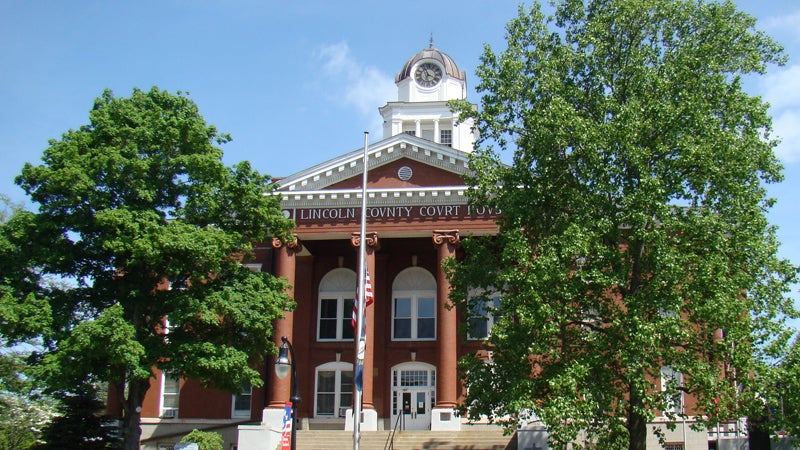Magistrates, mayors and attorneys meet over 911 fee court ruling
Published 12:04 pm Wednesday, July 3, 2019

- Photo by Abigail Whitehouse Lincoln County Attorney Daryl Day addresses questions from Stanford Water Commission Attorney Jonathan Baker and city representatives on the recent 911 fee court ruling.
|
Getting your Trinity Audio player ready...
|
STANFORD – The funding of Bluegrass 911 services has hung in the balance for years as the issue of placing fees on water meters has made its way through the courts.
After a recent Circuit Court ruling, which landed in favor of the Lincoln County Fiscal Court, the mayor of each incorporated city, along with their attorneys and the Stanford Water Commission, met in an attempt to negotiate prior to any appeal being filed.
But an attempt is all that came of the hour-or-so-long meeting, as none of the parties seemed to agree on how to move forward, or what would be fair compensation to the water companies for collecting the fees.
With landline phones becoming a thing of the past, the issue of how to fund Bluegrass 911 and it’s dispatch services came into focus a few years ago.
After a few counties in Kentucky began to move forward with new ideas, such as fees on water meters or land parcels, the Lincoln County Fiscal Court followed suit.
Fast forward several years and court rulings later, and the issue has yet to be resolved in Lincoln County.
Garrard County, however, has moved forward with the fees on water meters, and has agreed to give water companies six percent of the fees collected for their services.
Lincoln and Garrard County both share the cost of Bluegrass 911, the regional emergency operation center which dispatches emergency services for both counties.
Circuit Court ruling
Lincoln County Circuit Court Judge Jeffrey Burdette issued a ruling in late May, concluding that the fiscal court had the authority to require water companies to collect the fees on water meters to fund 911. Burdette went as far as to say the reimbursement percentage being requested by the cities and water companies is double that which the state has determined reasonable in similar circumstances.
The civil action suit was filed by the City of Stanford, acting through the Stanford Water and Sewer Commission, as well as the City of Hustonville and the City of Crab Orchard.
Lincoln County Judge-Executive Jim Adams, as well as the fiscal court magistrates, were named as defendants.
In his ruling, Burdette stated, “the ordinance at issue does not usurp the cities’ authority to fix or regulate the price of water in violation of the statute.”
“The Lincoln County Fiscal Court clearly did not exceed its authority in passing the ordinance, nor is the ordinance unconstitutionally vague as it is written,” Burdette stated. “While accepting it may pose an inconvenience to the cities, the same is not enough to establish a government taking of property under the law, especially in light of police power granted to counties by KRS 65.760. Moreover, the reimbursement percentage the plaintiffs are entitled to receive is double that which has been determined reasonable by the General Assembly in like circumstances.”
A meeting with all parties
Attorneys did most of the talking during the June 28 meeting, with Stanford Water Attorney Jonathan Baker leading the discussion.
One of the first questions Baker had on behalf of the cities was if and how 911 services will be dispatched for the cities as the court case moves forward.
County Attorney Daryl Day said for now, services will be dispatched as is but if the funding is not there, and the fiscal court votes to opt out of the original agreement, the cities may have to come up with their own 911 funding. The county would then draft a new agreement with Bluegrass 911 and fund dispatch services for county operations such as the sheriff’s office and county fire department and others.
“We haven’t sent the letter saying we’re opting out at this point,” Day said.
Following the meeting, Stanford fire Chief Scott Maples reiterated the need to fund the service regardless and how the debate has caused city emergency services stress about the dispatch services they’ll receive moving forward.
“The city is not getting the service we once had from dispatch because of this lawsuit,” Maples said. “That’s not a jab at dispatch, they do a great job. It’s going to get worse the more this is debated. Its going to end up costing a delay in response, costing someone their life or property. The water department, fiscal court or city council don’t have to deal with this pressure.”
Maples reiterated that his comment was not against the dispatch services, but he fears the ongoing debate may result in the cities only receiving the basic services.
Baker said another concern residents in the cities seem to have is paying county taxes.
“And they all get county services,” Day said.
Baker added that includes Bluegrass 911.
“It’s also the jail, emergency management, there’s a lot of services that city residents get from the county,” Day said. “As far as I know, none of the cities pay any fee to have their prisoners housed in the jail. None of the cities have their own dog warden service.”
Hustonville Mayor Marc Spivey added that Hustonville does pay $50 monthly for a dog warden.
Baker also wanted to clear up any threats that may have been made as far as the county not paving roads in city limits.
Magistrate David Faulkner addressed that concern as the magistrate of District 1, which includes Stanford.
“…the city knows that I’ve been willing to do as much as I possibly can to blacktop city streets,” Faulkner said. “But the fact of the matter is…by law, we’re supposed to be reimbursed for that by the city.”
Day said he wasn’t sure how much cities are required to reimburse but he does know by law, the county is not required to spend money on city road maintenance.
“They don’t have to blacktop city streets. They don’t have to do snow removal on city streets,” he said.
As far as housing city inmates, Jailer Rob Wilson said they account for about 40 percent of the jail population.
“Times about $35 a piece, per day, that’s a city expense that we’re covering,” Faulkner said. “That’s a tremendous expense that we’re absorbing…”
Day then directed the discussion back to the 911 fees.
“What do any of the cities have in their budget for 911?” Day asked.
Faulkner said the county has budgeted $130,000 from the general fund to cover the shortfall.
“That’s $130,000 out of blacktop. That’s $130,000 out of any services we have to provide,” Faulkner said.
Baker said if an appeal is filed by the cities and water commission, the county and cities need to maintain a healthy, working relationship.
“You might as well cut to the chase and say what happens if they file an appeal,” Faulkner said.
Day said he can’t speak for the fiscal court as far as what services they’ll continue to provide the cities free of charge but one thing the county does plan to discuss is “bond the appeal.”
“That means that these fees are going to be running up and we’re going to ask that money be set aside in an account so that if we are successful on the appeal, we would automatically get that money. The fees would not start at the end of the appeal, they would start now to be assured that we get that lump sum of money,” Day said. “To assure that, you ask for an appeal bond.”
The county hasn’t done that so far throughout the litigation but because it is getting so expensive, Day said at some point the county is going to have to start getting money back from what is being put into 911.
“911 is going to have to have equipment upgrades and we’re going to have to be prepared for that,” he added.
Judge-Executive Jim Adams reminded all parties that the fees collected, whether it be landlines or water meters, do not go to the fiscal court, but flow directly to Bluegrass 911.
Adams said water meter fees would be no different.
“They will not flow through fiscal court so if you think we can buy a bulldozer with a water meter fee, we can’t. It’s restricted,” he said. “We need to decide today whether we’re going to appeal because we’ve been at this for six years, an appeal is not going to matter.”
While the court debate revolves around the question of authority when it comes to implementing the fees, the June 28 meeting mostly focused on the percentage water companies will receive to collect.
Day said Laurel and Simpson Counties, and the City of Franklin, are about to implement water meter fees. Grant and Whitley Counties are also in the process, he said.
As far as the percentage for collecting the fees, Day said water companies in Laurel County are being given one percent, the City of Franklin is doing it for zero percent and the others are doing it for either one-or-two percent.
“We’ve heard that if the water companies in Lincoln County don’t get 10 percent that they’re losing money,” Day said. “I don’t know how Laurel County can do it for one percent but anything less than 10 percent, or even six percent here, and we’re having to take a step back.”
Garrard County has agreed to give water companies six percent for collecting the fees.
Baker said the federal and state governments are going to require more of the water companies in two years and the fee will have to be “bumped up” in the future.
Baker also reiterated that a letter was sent to the fiscal court that stated the cities’ and water companies’ understanding of how important Bluegrass 911 services are to the entire county and the need for county and city governments to sit down and negotiate.
“What we proposed in 2017, prior to this, was six percent…and not one person responded to that,” Baker said. “We didn’t receive any response, not a phone call or a letter, to try and resolve that. So this could have been resolved in 2017, without the necessity of a lawsuit being filed. That’s the same fee that Garrard County is collecting after years of lawsuits.”
Magistrates, mayors weigh in
Magistrate Joe Stanley said no one in the room can disagree with the fact that Bluegrass 911’s services are essential to everyone.
Baker said the debate has nothing to do with the importance of 911.
Faulkner turned to the mayors in the room and asked why they disagree with the $4 water meter fee.
“What is the reason that you don’t want to do it?” Faulkner asked.
“Why didn’t you respond to the 2017 letter?” Baker responded.
“Because we didn’t,” Faulkner said. “I’m perfectly fine with the (court) ruling. I think if the water company doesn’t want to take the $4 collected on the meter, and they think they can’t do it for three percent…I think you have a power issue and a management issue…everyone else can do it, but why Stanford Water can’t do it, makes no sense to me.”
Stanford City Attorney John Hackley said the broad question is about the county’s authority.
“I think what Jonathan was asking…under this opinion, what prevents a fiscal court from saying, ‘you know, that sheriff’s office cost a lot of money, that jail costs a lot of money,'” Hackley said.
Day said the statute that the ordinance was based on limits the county’s authority.
“There’s no statute that says the fiscal court can put a fee on anything to fund the sheriff’s office or the jail,” Day said.
Magistrate Lonnie Pruitt said it’s not fair to keep the fees on landlines and make the elderly portion of the population cover the whole cost of 911 and the cities and counties have to work together.
“I don’t like to think the fiscal court only thinks about the fiscal court. I’m a taxpayer, I’ve lived in Lincoln County my whole life and I’m appreciative of every one of you serving on city councils. I know you’ve got issues, but it’s us working together,” Pruitt said. “I didn’t think it was going to be an issue because we are looking at a fair tax. We know that electricity, water and sales tax is the fairest tax in the county because everybody uses it.”
Dalton Miller, a Stanford City Council member, said right now the only issue is how to fund Bluegrass 911.
“…collect the $4 during the appeal process and pay 911, because here’s the thing, if something goes wrong at my house, and I can’t get 911, I can’t get nobody to respond…everybody including myself is responsible for everybody,” Miller said.
“We’re responsible for everyone, why are we bickering over $4 a month?” Miller asked.
The judge has ruled, Miller said.
“Let’s pay it, let’s fund the 911 center and let’s move on and quit the bickering and fighting.”
Attorneys continued to debate the recent court ruling, which the cities and water company have a stipulated amount of time to appeal, before concluding the meeting without resolution.





